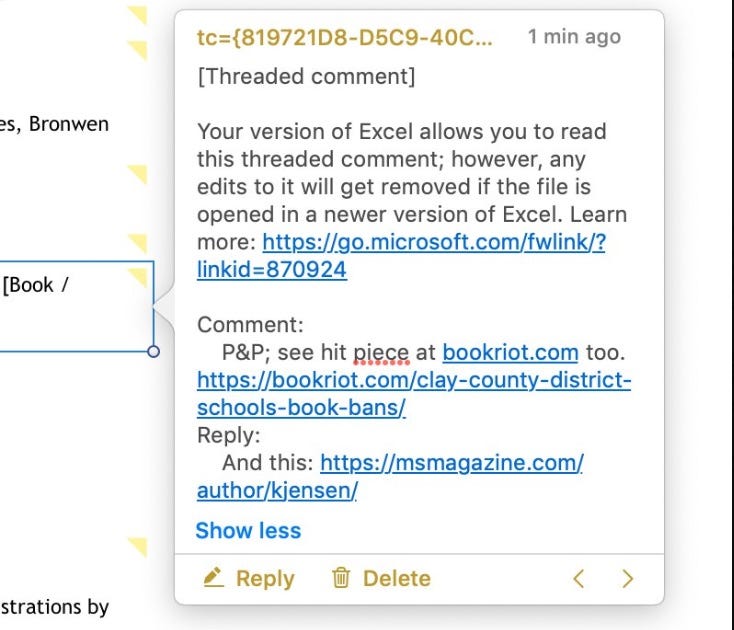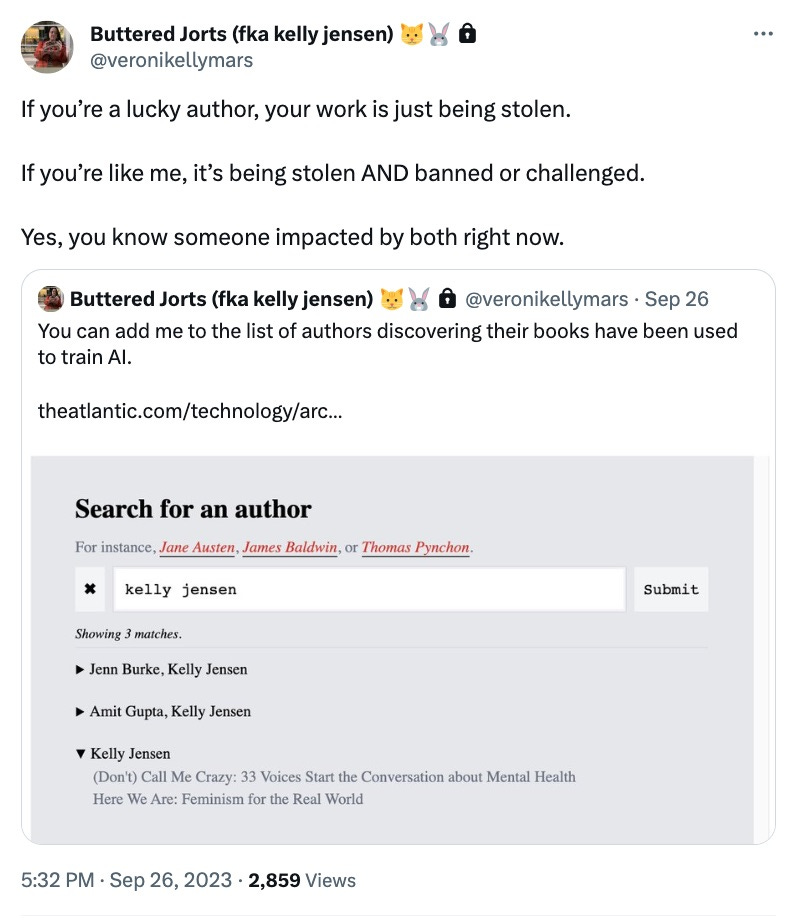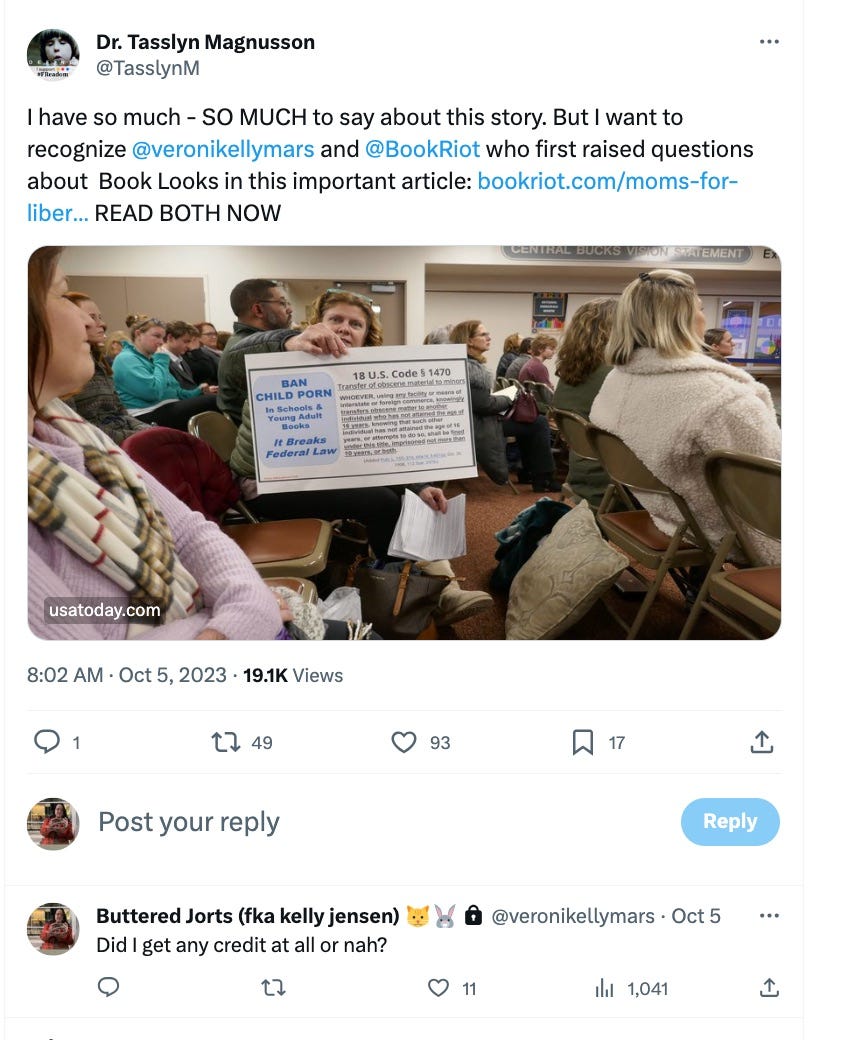I took the last two weeks out of the office, but even not being on the clock, my work continued to follow me. First, I found myself on this list at The Atlantic. My books have been used to help train AI, a tool that has a lot of power in the right contexts but which now is being trained with my work to help put me out of work. Without my permission, my books were stolen and my ideas–as well as the ideas of dozens of my contributors–were stolen. There was no payment for this, of course. In a coincidence of timing, I happened to get my royalty statements from the last half year and let’s just say I will be able to fill up my car’s gas tank thrice, if I am lucky.
Harpers Bazaar created a mega list of banned books from the work being done by people like me (and indeed, database creator extraordinaire Tasslyn Magnusson). It’s conveniently linked for you, title by title. You’ll find my book Body Talk on there, though the single ban noted is the only thing you’ll find. The list gives no context or meat, offers no insight into the whys or hows or silence around the banning of my book or the thousands of others. But you can click the link and buy them, I guess.
These two things, in conjunction, are difficult to grapple with as a creative, as a writer, and as a person. They’re complicated, too, by my own investment in the anti-book ban work. The punches come from all sides.
The first week of my time off was spent celebrating my 39th birthday, then getting a debilitating migraine, then driving up north for a yoga retreat with my studio family. It was beautiful, and I got the opportunity to witness so much beauty in nature. I took part in a full moon ceremony, ate the most delicious squash and turkey soup imaginable, and rediscovered the magic of time. Time moves the same no matter what, but our perceptions can make a minute last an hour or a second.
My second week out of the office was Banned Books Week. But it was hardly time off, and it was hardly time off from the reality of book bans. I did an event for Illinois school librarians on Monday, then had events lined up for Thursday night and Friday afternoon.
On Thursday morning, I was tagged in a quote retweet that gave me credit for work I had done that helped lead to the tweet being shared.
Before I could even get an answer to my question, Tasslyn was in my private messages telling me she told the author I did this work already and deserved credit for it. That I did the breaking of the story. That I put my neck out.
But no where did the author give my work a link. That stung.
What stung more, though, was that the author went on a long Tweet thread about how they did their work. Fine, great.
That writer is also someone who got on the phone with me a month ago to ask about how to publish a book.^ I gave him my time and knowledge–for free–and in return, the story I’ve been begging to hit mainstream media did, but without a lick of credit to my work leading to it. Were it someone who failed to Google, I’d extend some generosity. Unfortunately, the reporter was told by Tasslyn and knew damn well who I was.
I went to my event that evening angry and annoyed. I also sucked it down: this was not something that the public library audience in attendance needed to hear about. They were there to listen to a talk about banned books and specifically, the results of the survey conducted by Book Riot and EveryLibrary about parental perceptions of the public library. The event went well, John and I had a great conversation, and the talk ended with the reminder that it’s important to show up to school and library board meetings to talk, that it is important to run for those positions, and that showing up is often enough to stop the right wing bad actors from their performances. It is important to give people information, but it is equally important to give them a thing to do.
Early Saturday morning, I woke up to discover one–several, perhaps–of those bad actors recorded the session on Thursday night without permission from myself, John, or anyone at the public library.
I’d become a star, and I’d only get to shine brighter on Monday when one of the notorious social media provocateurs indeed confirmed that I am being recorded all the time.
I immediately locked down on every outlet.
*
Two years ago this month, I began my weekly roundups of book censorship news. This came a year after I have been covering stories as they came up in the early days of this censorious era, and it came a few months after I broke the story of groups like the notorious one in Chicagoland was looking for books they deemed “inappropriate”–in this case, Robie Harris’s classic It’s Perfectly Normal–in libraries, accosting the librarians, recording the interactions, then getting valorized as heroes across the right’s social media.
The days and the hours have been long. The two years, even longer.
Time moves the same no matter what, but our perceptions can make a minute last an hour or a second. For me, this has been an endlessly long slog, one that continues to expose me to how many ways it is possible to be angry, to be hurt, and yes, even if not the topic here nor experiences in any recent memory, to be happy or excited or eager or hopeful.
I have learned and observed a whole hell of a lot, though. More than any one person should in two years on an issue that has emerged over and over and over again throughout American history, with the same lack of answers or resolutions but a whole lot of people who get their ten minutes.^
My books don’t get displayed for banned books week. They don’t get talked about as must-reads when people are asked. My work cannot even get credited as the first to cover a topic no one else had been writing about or caring about.
My books can be held against me for speaking up. That’s precisely what Bruce has done to all of my books in Clay County, when I wrote the first piece to talk about how he’s challenging hundreds of books at a time in the district. He’s gone on to become a favorite of so many reporters and outlets, but again, no credit to me for telling this story months before anyone else bothered.
It cost me, though.

My work continues to be stolen, borrowed without credit, and used to train others how to do the work without putting in the blood, sweat, and nights of tears going it alone and wondering if today is the day they show up to your house to kill you however they can.
Because even if it isn’t physical violence, it is emotional and mental violence.
If we demand that book banners show their work, those of us shining a light on those things should be, too. No one expects you to know it all, nor do they expect you to follow it all. But goddamn. Reporters have the same access to www.google.com that I do, and that’s if they haven’t been told to look at my work or taken my time and talked to me on the phone.
Intellectual violence hurts. When it’s coming from people with the same moral values and belief in intellectual freedom as you, it’s more painful than can ever be properly articulated.
Notes
+ I tweeted about a really interesting conversation that took place during one of my talks at the Illinois school librarian conference. It had turned into a discussion of Scholastic’s new scheme to put the work of denying access to diverse books at their book fairs onto the shoulders of school librarians. I found nothing in my research on it immediately after, save for a lengthy Reddit post. I’m glad that The Mary Sue credited me for using the public forum of Twitter to bring it up, though their story doesn’t answer any of the questions (that would be why I haven’t written about it–there aren’t any to be had quite yet, but my suspicion is that Scholastic knows how they are being specifically targeted by the bigots).
^ In fact, I told him about my current work in progress. I could kick myself for talking about a project that isn’t yet completed or sold knowing all of this. So much for being generous with time and knowledge!
^^ I highly recommend researching the 1953/4 US Senate Subcommittee on Juvenile Delinquency, which centered on the role of comics on childhood misbehavior. The report reads like the last two Subcommittees assembled this year and last meant to talk about book bans and–if I am being honest–are precisely why I refuse to engage with the latest or write about it. Folks like RFK know their performances will be included in the reports and live through history. This keeps their names in our mouths for decades and decades.






